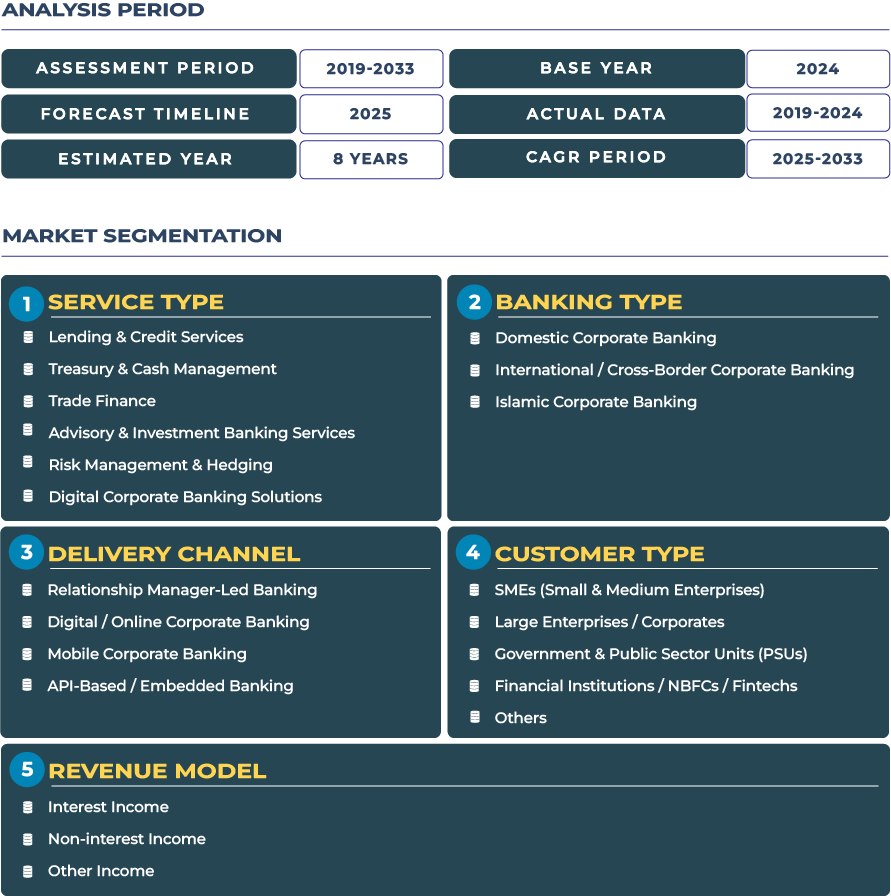South Africa Corporate Banking Market Outlook: Empowering Digital Finance for SMEs and Large Enterprises
The South Africa Corporate Banking Market is entering a transformative phase, defined by digital innovation, inclusion, and structural financial modernization. As South Africa positions itself as a financial leader in Sub-Saharan Africa, corporate banks are leveraging digital channels, mobile banking ecosystems, and AI-powered treasury management systems to support both large enterprises and small-to-medium-sized businesses (SMEs). The market is estimated at USD 10.0 billion in 2025 and is projected to reach USD 10.5 billion by 2033. This growth trajectory, although steady, reflects the ongoing consolidation of digital corporate lending, working capital management, and supplier finance solutions in a challenging yet opportunity-rich economic environment.
Note:* The market size refers to the total revenue generated by banks through interest income, non-interest income, and other ancillary sources.
South African banks are strategically re-engineering their corporate banking ecosystems to enhance efficiency, mitigate risks, and unlock new sources of liquidity for corporates. Digital lending platforms, real-time treasury solutions, and blockchain-backed trade finance instruments are transforming the way businesses access financial services. The South African Reserve Bank (SARB) has also been instrumental in creating a secure regulatory framework, encouraging financial innovation while ensuring systemic stability.
Market Outlook: Digital Corporate Finance Leading South Africa’s Banking Reinvention
South Africa corporate banking landscape is witnessing a convergence of fintech innovation, policy reform, and client-centric service design. Traditional financial institutions such as Standard Bank, Nedbank, and Absa Group are integrating digital platforms to extend corporate financing to SMEs, especially across manufacturing, mining, and agriculture. These developments are crucial as SMEs account for nearly 60% of employment in South Africa, making them central to the nation’s economic revitalization efforts.
While the corporate lending environment remains affected by global macroeconomic pressures, including inflationary constraints and a high repo rate environment, corporate banks are responding by offering specialized products such as digital cash management systems and supplier financing programs. The integration of digital treasury services and electronic trade documentation platforms is enabling real-time decision-making, liquidity optimization, and faster access to cross-border finance. This evolution signifies a decisive shift from traditional transactional banking to a more integrated, data-driven, and value-added banking model in South Africa.
Drivers & Restraints: Balancing Commodity Strengths and Financial Headwinds
Commodity Corporates Fueling Trade and Working Capital Finance
Large mining and commodity corporates, including firms in gold, platinum, and coal, are catalyzing the South Africa Corporate Banking Industry through their significant demand for trade and working capital finance. Banks are actively providing pre-export finance facilities to align with commodity cycles and global price trends. With increasing regional trade integration under the African Continental Free Trade Area (AfCFTA), South African corporate banks are also strengthening regional trade corridors, supporting exports, and financing logistics value chains.
Political Volatility and Capital Constraints Hampering Expansion
Despite these positives, policy uncertainty and fiscal rigidity continue to challenge the sector’s growth potential. Structural unemployment and energy supply constraints have also limited SME growth and, consequently, creditworthiness. Additionally, the high cost of capital, reflected in tight liquidity and elevated borrowing rates, has affected large infrastructure and energy project financing. As per National Treasury of South Africa, public-sector fiscal reforms are ongoing to strengthen financial governance and expand domestic capital markets. However, corporate banks remain cautious about long-term lending commitments in politically volatile sectors.
Trends & Opportunities: The Rise of Digital Trade, Supplier Finance, and Local Debt Markets
Growth in Trade Finance and Supplier Credit Channels
The rise of supplier finance in South Africa’s mining and agricultural value chains is a defining trend shaping the country corporate banking landscape. Corporate clients are increasingly adopting digital trade finance platforms that integrate invoicing, documentation, and payments. This trend aligns with the broader digitalization of treasury and cash management operations, enabling faster working capital cycles and improved liquidity visibility. The adoption of SWIFT GPI (Global Payments Innovation) and blockchain-based smart contracts is further modernizing trade and project financing practices.
Opportunities in Local Corporate Bond and Fintech Collaboration
Emerging opportunities include the deepening of the local corporate bond market and partnerships between banks and fintech startups. With regulatory backing from the Financial Sector Conduct Authority (FSCA), banks are collaborating with fintechs to offer embedded corporate finance and risk management tools. This synergy supports digital transformation across corporate treasury functions and enhances financial inclusion for mid-tier businesses. Moreover, as ESG principles gain traction, green finance and sustainable bond issuance are expected to provide new avenues for capital deployment and investment diversification in South Africa corporate banking sector.
Competitive Landscape: Strategic Transformation Among South Africa’s Leading Banks
The competitive environment in the South Africa Corporate Banking Market is driven by both domestic leaders and international entrants. Major banks like Standard Bank, Absa, Nedbank, and FirstRand continue to dominate, but are diversifying their portfolios toward digital corporate banking solutions. For instance, Standard Bank’s 2024 rollout of AI-driven treasury optimization services for mining corporates demonstrated a strategic focus on data analytics for real-time liquidity management. Similarly, Absa has expanded supplier finance offerings through cloud-based trade platforms, aligning with its strategy to enhance SME credit access and streamline working capital solutions.
These strategies, ranging from pre-export financing and commodity-linked lending to local bond underwriting, reflect a broader industry pivot toward sustainable profitability and technological enablement. Local debt issuance and FX risk mitigation remain key operational priorities, especially amid fluctuating commodity cycles and volatile currency conditions.







